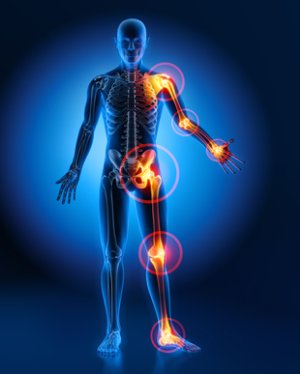Lack of vitamin D increases rheumatic pain
- and other inflammatory conditions
 It is hardly a coincidence that many patients with arthritis feel worse during the winter period where the sun sits too low in the sky for us humans to be able to synthesize vitamin D. In patients with rheumatoid arthritis, there is a direct link between vitamin D levels and neuropathic pain caused by irritated nerves. This was shown in a study that is published in International Journal of Rheumatic Diseases.
It is hardly a coincidence that many patients with arthritis feel worse during the winter period where the sun sits too low in the sky for us humans to be able to synthesize vitamin D. In patients with rheumatoid arthritis, there is a direct link between vitamin D levels and neuropathic pain caused by irritated nerves. This was shown in a study that is published in International Journal of Rheumatic Diseases.
Arthritis is widespread. Rheumatoid arthritis is when several joints are attacked by chronic inflammation caused by an overactive immune defense. This may eventually lead to destruction of the cartilage, the underlying bone, and the surrounding joint capsule, causing bone deformity. There is every reason in the world to look for natural solutions for preventing and treating arthritis and other conditions caused by chronic inflammation.
Global vitamin D deficiency20-60% of the British population lacks vitamin D. Vitamin D deficiency is also widespread in the rest of Europe, the United States, and in Australia. |
Lack of vitamin multiplies joint pain
The researchers in the above new study recruited 93 patients suffering from rheumatoid arthritis. The aim of the study was to compare the patients’ blood levels of vitamin D with the degree of neuropathic pain assessed by means of the LANSS (Leeds Assessment of Neuropathic Symptoms and Signs) scale. It turned out that patients with blood levels of vitamin D lower than 20 ng/ml had neuropathic pain that was 5.8 times higher than the pain observed in patients whose vitamin D levels in the blood were above 30 ng/ml.
The researchers stated that there is a clear link between vitamin D deficiency and the degree of neuropathic pain in patients with rheumatoid arthritis. They say that supplements may be a relatively easy, safe, and inexpensive way to improve therapy for the many patients with rheumatoid arthritis who lack vitamin D.
The more vitamin D, the less inflammation
Earlier research conducted by scientists from National Jewish Health in Denver, USA, shows how vitamin D controls the immune system. Of course, it is vital that the immune defense is able to fight infections and repair cell damage.
However, it is also important that the immune system does not overreact, as this may cause chronic inflammation with pain and tissue damage. In this in vitro study, the scientists fed to white blood cells different quantities of vitamin D from solutions that equaled 0-50 ng/ml. Afterwards, the white blood cells were exposed to a molecule called LPS that normally triggers an intense inflammatory response.
The researchers observed that the white blood cells that had not been given vitamin D or had been exposed to a solution that corresponded with 15 ng/ml produced high quantities of different cytokines, which play a key role in inflammation. The white blood cells that got a solution, which equaled 30-50 ng/ml of vitamin D, showed a significantly reduced response, and the least inflammation was observed with the white blood cells that got the most vitamin D. This study revealed that vitamin D’s ability to inhibit inflammation depends on the amount of vitamin D in the blood. The best results are seen with values higher than 50 ng/ml.
Measuring vitamin D levels in the blood
Vitamin D levels in the blood are measured as 25-hydroxy-vitamin D. In Denmark, the official threshold level for vitamin D in the blood is 50 ng/ml, but many experts believe that this level is insufficient and recommend as much as 75-100 ng/ml for optimal disease prevention.
Official recommendations and the actual need for vitamin D
Scientists recommend an RI (reference intake) level for vitamin D that is somewhere between 30 and 100 micrograms daily. It is easy for a fair-skinned person to synthesize this amount on a hot summer’s day. However, for someone who uses sunscreen with sun factor, or for someone with dark or ageing skin, it is difficult to synthesize vitamin D. Also, overweight individuals and diabetics have an increased need for the nutrient.
Vitamin D, supplements, absorption
The diet only provides limited amounts of vitamin D. Therefore, we need to supplement during the winter months and in situations where it is difficult or impossible to get enough vitamin D from the sun. Vitamin D is lipid-soluble, and it is therefore best to take vitamin D dissolved in oil in soft gelatin capsules. Vitamin D can be ingested safely in doses between 30 and 80 micrograms daily.
References
Yesil H. et al. Association between serum vitamin D levels and neuropathic pain in rheumatoid arthritis patients. International Journal of Rheumatic Diseases,
Jessica Martin. Vitamin D Deficiency Associated With Neuropathic Pain in Rheumatoid Arthritis. Clinical Pain Advisor September 14, 2017
http://www.clinicalpainadvisor.com/neuropathic-pain/patients-with-rheumatoid-arthritis-and-neuropathic-pain-may-benefit-from-vitamin-d-supplementation/article/688564/
Aya Mousa et al. Effect of vitamin D supplementation on inflammation: protocol for a systematic review. BMJ Open 2016
http://bmjopen.bmj.com/content/6/4/e010804.full
https://www.netdoktor.dk/sygdomme/fakta/leddegigt.htm
Search for more information...
- Created on .








